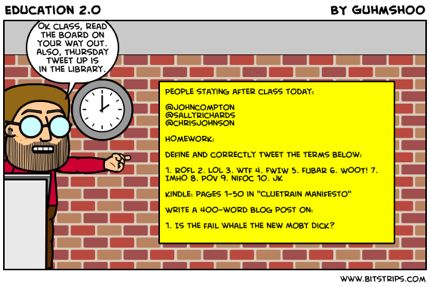Has the UK gone too far in social media education?

I have to share a cartoon that made its way to me last week (yes, I'm as behind in my blogging as I am in my day job, my spring yard work, and virtually every other aspect of my life) and then give a bit of thought to the story out of the UK that the cartoon satirizes.
Special thanks to @guhmshoo for the laugh. Now for a few thoughts, because, while the cartoon is tongue-in-cheek, many people have expressed concern that we might be treading in dangerous territory for the sake of "21st Century Skills."
The Guardian (among other outlets) ran a story last week on changes in the United Kingdom's new primary school educational curricula that contained a heavy emphasis on social media. At first blush, this doesn't seem like a bad thing, right? 21st Century Skills don't mean social media, but they do mean learning to collaborate in new and useful ways with direct application to communication in a global economy.
According to The Guardian,
...the draft plans will require children to master Twitter and Wikipedia and give teachers far more freedom to decide what youngsters should be concentrating on in classes...The proposals would require children to leave primary school familiar with blogging, podcasts, Wikipedia and Twitter as sources of information and forms of communication.
Again, this doesn't seem like a bad foundation in technology for primary school children to take to the next level of education. That assumes, of course, that the curriculum include sufficient emphasis on the appropriate use of Wikipedia (e.g., as a starting point for research, taken with a dose of skepticism and a desire to dig beyond its pages) and safe uses of Twitter-like tools (instead of simply teaching kids to use Twitter, which is hardly rocket science).
Here is where a lot of people started raising red flags about the proposed curriculum, although I think unnecessarily so. In addition to a serious focus on web-based tools and learning, the proposed curriculum removes requirements for teaching key periods of history, including World War II and the Victorian Age. So we're teaching Twitter and skipping World War II? Not exactly, if we take a closer look at the proposal.
In fact, the curriculum seems to be suggesting really progressive reforms in elementary education (primary ed for my non-US readers); the Twitter and Wikipedia pieces have simply caught the attention of the media since they're quite a bit sexier than reducing redundancies and improving educational quality.
For example, teachers would no longer be required to teach World War II at the primary level because it is covered in depth at the secondary level. Rather,
Children [should] be able to place historical events within a chronology. "By the end of the primary phase, children should have gained an overview which enables them to place the periods, events and changes they have studied within a chronological framework, and to understand some of the links between them."
Sounds like a fine goal, doesn't it? I wish the average American middle schooler could do that. Same goes for reforms to the UK math curriculum. Calculator use is being de-emphasized while mental arithmetic gets a nod.
In fact, the reforms go so far as to cut an overly broad curriculum down to 6 core areas: "understanding English, communication and languages, mathematical understanding, scientific and technological understanding, human, social and environmental understanding, understanding physical health and wellbeing, and understanding arts and design."
I'm going to give the UK government the benefit of the doubt here and assume that they are asking teachers to instruct kids about social media and web technologies in a sensible manner. The rest of the curriculum looks to be a leap forward toward creating high-performing schools and ensuring that students have a solid groundwork in place for their secondary education.
